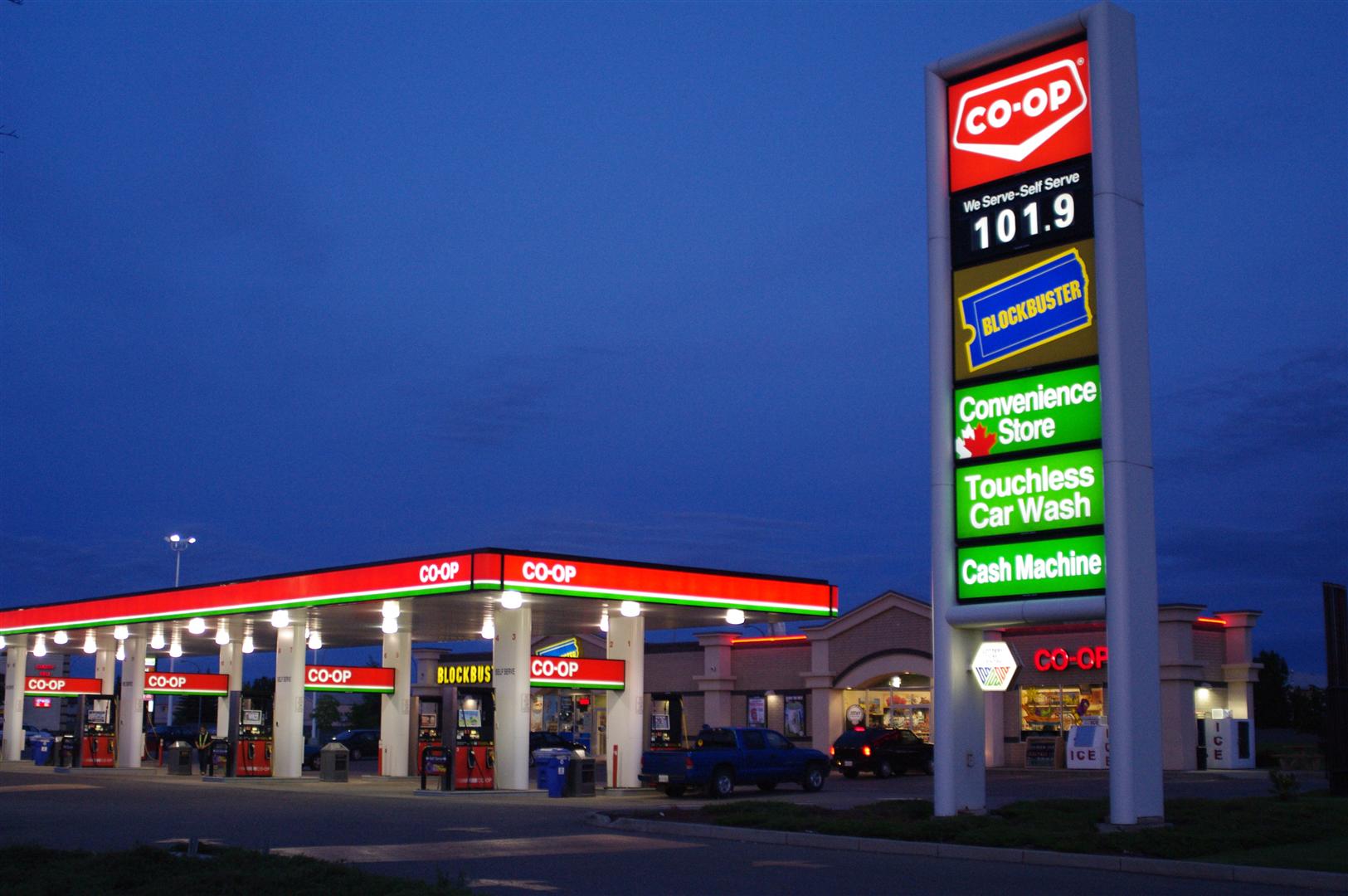
The familiar sight of a Co-op store is often a comforting one, a beacon of community and reliable service. From grocery essentials to hardware supplies, Co-ops have long been a cornerstone of local economies. But the retail landscape is constantly evolving, and businesses must adapt to meet the changing needs of their customers. What was once a straightforward grocery or hardware store might now include services like pharmacies, liquor stores, and even gas stations. This expansion reflects a desire to offer a more comprehensive and convenient shopping experience, consolidating errands and saving customers valuable time.
The retail gasoline market is a competitive arena, dominated by major players with established brands and extensive networks. For a company like Co-op to enter this market, careful consideration and strategic planning are essential. Factors such as location, pricing, fuel supply, and customer loyalty all play crucial roles in determining success. Moreover, environmental regulations and the growing demand for alternative fuels present both challenges and opportunities for new entrants in the gasoline sector.
In today’s world, convenience is king. Consumers are increasingly looking for one-stop shops where they can accomplish multiple tasks in a single trip. This trend has driven the integration of various services into traditional retail outlets, blurring the lines between different types of businesses. A gas station, for example, is no longer just a place to fill up the tank; it often includes a convenience store offering snacks, drinks, and other essentials. This integration caters to the busy lifestyles of modern consumers and enhances the overall customer experience.
The rumors have been swirling, whispers in the aisles of local Co-ops and murmurs among community members. Is it true? Are we finally seeing a new avenue for Co-op’s commitment to serving its members? The answer appears to be leaning towards a resounding yes. Prepare yourselves, because the news is out: **Co-op to open gas bar**. This move signals a significant expansion and a renewed dedication to providing comprehensive services to its loyal customers.
This strategic initiative by Co-op promises not only added convenience but also potential cost savings and increased value for its members. Let’s delve into the details and explore what this exciting development means for the future of Co-op and the communities it serves. The announcement that **Co-op to open gas bar** has sent ripples of anticipation throughout the local economy.
Strategic Expansion: Why a Gas Bar?
Meeting Member Needs
The decision for **Co-op to open gas bar** is deeply rooted in understanding and responding to the evolving needs of its members. Co-ops, by their very nature, are member-owned and democratically controlled organizations. This means that their decisions are guided by the collective desires and requirements of the people they serve. Through surveys, feedback sessions, and ongoing dialogue, Co-op has identified a clear demand for convenient and affordable fuel options within its service areas.
Many Co-op members already rely on the organization for their grocery, hardware, and agricultural needs. Adding a gas bar to the mix creates a more comprehensive and convenient shopping experience. Members can now consolidate their errands, filling up their vehicles while also picking up groceries or supplies. This saves time and effort, making life a little easier for busy families and individuals.
Furthermore, the Co-op model emphasizes providing value to its members. By offering competitive fuel prices and potential member benefits, the gas bar aims to deliver significant cost savings. This aligns with Co-op’s core mission of improving the economic well-being of its members and strengthening the communities it serves.
Ultimately, the decision to expand into the gasoline market reflects Co-op’s commitment to its members and its dedication to providing the services they need in a convenient and affordable manner. It’s a strategic move that is designed to enhance the overall value proposition of Co-op membership and strengthen its position as a trusted community partner.
The gas bar initiative also aims to create synergies with existing Co-op operations. For example, members might be able to earn points on fuel purchases that can be redeemed for discounts on groceries or other products. This integrated approach enhances the overall value of Co-op membership and encourages members to utilize a wider range of services.
Diversifying Revenue Streams
Expanding into the gasoline market provides Co-op with an opportunity to diversify its revenue streams and enhance its financial stability. The retail gasoline sector is a significant market with consistent demand, providing a reliable source of income. By tapping into this market, Co-op can reduce its reliance on traditional retail sales and create a more resilient business model.
This diversification is particularly important in today’s rapidly changing retail landscape. The rise of e-commerce and changing consumer preferences have created new challenges for traditional brick-and-mortar stores. By expanding into new areas like gasoline, Co-op can adapt to these changes and ensure its long-term viability.
Furthermore, a successful gas bar operation can generate additional revenue that can be reinvested back into the community. This could include funding for local initiatives, supporting community events, or improving existing Co-op facilities. This reinvestment reinforces Co-op’s commitment to community development and strengthens its ties to the people it serves.
The added revenue stream will strengthen the Co-op’s position in the market, and allows for expansion into other areas to further bolster its community presence.
In addition, the gas bar operation can create new employment opportunities within the community. This is a valuable contribution to the local economy and helps to support families and individuals.
Competitive Advantage: The Co-op Difference
Co-op possesses a unique competitive advantage in the retail gasoline market: its strong brand reputation and loyal member base. Co-ops have a long history of providing quality products and services at competitive prices. This reputation has earned them the trust and loyalty of their members, who are more likely to support a Co-op gas bar than a competing brand.
Furthermore, the Co-op model emphasizes member ownership and democratic control. This means that members have a direct say in how the organization is run and how profits are distributed. This fosters a sense of ownership and loyalty, encouraging members to support the Co-op and its initiatives.
Co-op can also leverage its existing infrastructure and resources to support the gas bar operation. This includes its distribution network, marketing capabilities, and customer service expertise. By integrating the gas bar into its existing operations, Co-op can achieve economies of scale and reduce costs.
The introduction of member benefits and loyalty programs can further enhance Co-op’s competitive advantage. These programs can reward members for their patronage and encourage them to choose Co-op over competing brands.
The Co-op’s community presence, paired with their known commitment to giving back, gives them a leg-up that most companies simply can’t offer. This adds a layer of customer loyalty that’s difficult to replicate.
Location, Location, Location: Site Selection
High-Traffic Areas
The success of any gas bar hinges on its location. Co-op is meticulously selecting sites for its new gas bars, focusing on high-traffic areas with significant visibility and accessibility. Locations near major highways, busy intersections, and commercial centers are prime candidates. These areas offer the greatest potential for attracting a steady stream of customers.
In addition to traffic volume, Co-op is also considering the demographic characteristics of potential locations. Areas with a high concentration of Co-op members, families, and commuters are particularly attractive. These demographics represent a strong potential customer base for the gas bar.
The availability of suitable land is also a key factor in site selection. Co-op needs to find sites that are large enough to accommodate the gas pumps, convenience store, and parking facilities. The sites must also meet environmental regulations and zoning requirements.
Another important consideration is the proximity to existing Co-op stores. Locating the gas bar near a grocery store or hardware store can create synergies and enhance the overall customer experience. This allows members to consolidate their errands and save time.
Careful planning and attention to detail are essential to ensure that the gas bar is located in the optimal location for success. A well-chosen site can significantly contribute to the profitability and long-term viability of the operation.
Proximity to Existing Co-op Services
Strategically positioning the gas bars near existing Co-op stores and services is a key element of the expansion plan. This allows for the creation of a more integrated and convenient shopping experience for members. By consolidating errands, members can save time and effort, making Co-op their preferred destination for all their needs.
For example, a gas bar located adjacent to a Co-op grocery store allows members to fill up their vehicles while also picking up groceries. This eliminates the need to make separate trips to different locations, saving valuable time and fuel.
Similarly, locating a gas bar near a Co-op hardware store allows members to fuel up their trucks or vans while purchasing supplies for their home improvement projects. This provides a convenient solution for homeowners and contractors alike.
The proximity of the gas bar to other Co-op services can also facilitate cross-promotional opportunities. For example, members who purchase fuel at the gas bar might receive coupons or discounts for groceries or hardware items.
Integrating the gas bar into the existing Co-op ecosystem enhances the overall value proposition for members and strengthens their loyalty to the organization. It also creates a more efficient and streamlined shopping experience.
Community Impact Assessment
Co-op is committed to responsible corporate citizenship and is conducting thorough community impact assessments before selecting sites for its new gas bars. These assessments evaluate the potential environmental, social, and economic impacts of the project on the surrounding community.
The environmental impact assessment considers factors such as air quality, water resources, and potential contamination from fuel spills. Co-op is committed to implementing best practices to minimize its environmental footprint and protect the health of the community.
The social impact assessment evaluates the potential effects of the project on local residents, businesses, and community organizations. Co-op is committed to engaging with the community and addressing any concerns that may arise.
The economic impact assessment considers the potential effects of the project on local employment, tax revenues, and economic activity. Co-op is committed to creating new jobs and contributing to the economic prosperity of the community.
The results of the community impact assessments will be used to inform the site selection process and ensure that the project is implemented in a responsible and sustainable manner.
Fueling the Future: Fuel Supply and Pricing
Securing Reliable Fuel Sources
Ensuring a consistent and reliable fuel supply is paramount to the success of Co-op’s gas bar operation. Co-op is working to establish strong relationships with reputable fuel suppliers to guarantee a steady flow of gasoline and other fuel products. This includes negotiating favorable contracts and diversifying its supply sources to mitigate the risk of disruptions.
In addition to traditional gasoline, Co-op is also exploring the possibility of offering alternative fuels, such as ethanol and biodiesel. This would cater to the growing demand for environmentally friendly fuel options and position Co-op as a leader in sustainable fuel practices.
Co-op is also investing in its own fuel storage and distribution infrastructure to ensure that it can efficiently and reliably supply its gas bars with fuel. This includes building new storage tanks and upgrading existing facilities.
A robust fuel supply chain is essential to maintaining competitive prices and ensuring that Co-op gas bars always have fuel available for their customers. This is a key factor in building customer loyalty and establishing a strong presence in the gasoline market.
Co-op’s commitment to sustainability extends to its fuel supply practices, including responsible sourcing and transportation methods.
Competitive Pricing Strategies
Offering competitive fuel prices is a crucial element of Co-op’s strategy for attracting and retaining customers at its new gas bars. Co-op is committed to providing members with affordable fuel options that are comparable to or better than those offered by competing gas stations.
To achieve this, Co-op is closely monitoring market prices and adjusting its pricing strategies accordingly. This includes offering discounts to members, implementing loyalty programs, and running promotional campaigns.
Co-op is also leveraging its purchasing power to negotiate favorable fuel prices with its suppliers. This allows it to pass on the savings to its members and maintain competitive prices at the pump.
Transparent and consistent pricing is also a key element of Co-op’s strategy. Members can trust that they are always getting a fair price for fuel at Co-op gas bars.
Co-op’s commitment to affordability is a reflection of its member-owned structure and its dedication to serving the best interests of its members.
Embracing Alternative Fuels
In response to growing environmental concerns and the increasing demand for sustainable transportation options, Co-op is actively exploring the possibility of offering alternative fuels at its new gas bars. This includes options such as ethanol, biodiesel, and potentially even electric vehicle charging stations.
Offering alternative fuels would not only cater to environmentally conscious consumers but also position Co-op as a leader in sustainable fuel practices. This could attract new customers and enhance Co-op’s brand reputation.
Co-op is carefully evaluating the feasibility and demand for different alternative fuel options in each of its markets. This includes considering factors such as government regulations, infrastructure requirements, and customer preferences.
The transition to alternative fuels is a gradual process, but Co-op is committed to playing a role in building a more sustainable transportation future. This includes investing in the infrastructure and technologies needed to support alternative fuel options.
By embracing alternative fuels, Co-op is demonstrating its commitment to environmental responsibility and its dedication to meeting the evolving needs of its members.
Beyond the Pump: Convenience Store and Services
Integrated Convenience Stores
Co-op gas bars will feature integrated convenience stores offering a wide range of products and services to cater to the needs of busy customers. These stores will stock a variety of snacks, drinks, groceries, and other essentials, making it easy for customers to grab what they need while filling up their vehicles.
The convenience stores will also offer services such as coffee, lottery tickets, and ATM access. This will provide added convenience and make Co-op gas bars a one-stop shop for customers on the go.
The layout and design of the convenience stores will be carefully planned to maximize efficiency and create a pleasant shopping experience. This includes clear signage, well-stocked shelves, and friendly customer service.
The convenience stores will also offer Co-op branded products, further strengthening the Co-op brand and providing members with access to their favorite Co-op items.
By integrating convenience stores into its gas bars, Co-op is enhancing the overall value proposition for its members and creating a more convenient and enjoyable shopping experience.
Enhanced Customer Experience
Co-op is committed to providing an exceptional customer experience at its new gas bars. This includes friendly and efficient service, clean and well-maintained facilities, and a wide range of products and services to meet the needs of its members.
Co-op employees will be trained to provide helpful and knowledgeable assistance to customers. This includes answering questions, providing directions, and resolving any issues that may arise.
The gas bar facilities will be regularly cleaned and maintained to ensure a safe and comfortable environment for customers. This includes keeping the pumps clean, emptying trash cans, and maintaining the landscaping.
Co-op is also committed to listening to customer feedback and using it to improve its products and services. This includes conducting surveys, monitoring social media, and responding to customer complaints.
By providing an exceptional customer experience, Co-op aims to build long-term relationships with its members and establish its gas bars as the preferred destination for fuel and convenience items.
Leveraging Technology
Co-op is leveraging technology to enhance the customer experience and improve the efficiency of its gas bar operations. This includes implementing mobile payment options, loyalty programs, and digital signage.
Mobile payment options allow customers to pay for fuel and convenience items using their smartphones or other mobile devices. This provides a convenient and secure way to pay and reduces the need for cash or credit cards.
Loyalty programs reward customers for their patronage and encourage them to choose Co-op over competing gas stations. These programs can offer discounts, rewards points, or other benefits to members.
Digital signage displays important information such as fuel prices, promotional offers, and community events. This provides a convenient way to communicate with customers and keep them informed.
By leveraging technology, Co-op is creating a more modern and efficient gas bar experience for its members.
Community Benefits and Co-op Values
Supporting Local Economies
The expansion of Co-op into the gasoline market is expected to have a positive impact on local economies. The new gas bars will create new jobs, generate tax revenues, and stimulate economic activity in the communities they serve.
Co-op is committed to sourcing products and services locally whenever possible. This helps to support local businesses and create a stronger local economy.
Co-op is also committed to investing in the communities it serves. This includes supporting local initiatives, sponsoring community events, and making charitable donations.
By supporting local economies, Co-op is contributing to the overall well-being and prosperity of the communities it serves.
The construction and operation of the gas bars will also require the services of local contractors and suppliers, further boosting the local economy.
Reinforcing Co-op Principles
The expansion into the gasoline market reinforces Co-op’s core principles of member ownership, democratic control, and community involvement. The gas bars will be owned and controlled by Co-op members, who will have a direct say in how they are operated.
Co-op is committed to transparency and accountability in its operations. Members will have access to information about the gas bar’s performance and financial results.
Co-op is also committed to ethical and sustainable business practices. This includes responsible sourcing, environmental protection, and fair labor practices.
By adhering to its core principles, Co-op is building a strong and sustainable business that benefits its members and the communities it serves.
The profits generated by the gas bars will be reinvested back into the Co-op system, further benefiting members and supporting community initiatives.
Environmental Responsibility
Co-op is committed to operating its gas bars in an environmentally responsible manner. This includes implementing best practices to prevent fuel spills, reduce emissions, and conserve resources.
Co-op is also exploring the possibility of using renewable energy sources to power its gas bars. This could include solar panels or wind turbines.
Co-op is committed to educating its members and employees about environmental issues and promoting sustainable practices.
By prioritizing environmental responsibility, Co-op is contributing to a cleaner and healthier environment for future generations.
The use of efficient lighting and equipment will also help to reduce the gas bar’s energy consumption and minimize its environmental footprint.
Conclusion
The announcement that **Co-op to open gas bar** marks a significant milestone in the organization’s commitment to serving its members and strengthening the communities it serves. This strategic expansion promises added convenience, potential cost savings, and a continued dedication to Co-op’s core values. From carefully selected locations to competitive pricing strategies and a focus on environmental responsibility, Co-op is poised to make a positive impact on the retail gasoline market.
The gas bars will also provide new opportunities for employment and economic development within the communities they serve. Co-op is committed to sourcing products and services locally whenever possible, supporting local businesses and creating a stronger local economy.
By integrating convenience stores and leveraging technology, Co-op is creating a more modern and efficient gas bar experience for its members. This includes mobile payment options, loyalty programs, and digital signage.
This is an exciting time for Co-op and its members. The expansion into the gasoline market is a testament to the organization’s commitment to innovation and its dedication to meeting the evolving needs of its customers. As Co-op continues to grow and evolve, it remains firmly rooted in its core principles of member ownership, democratic control, and community involvement.
If you enjoyed this article and would like to learn more about Co-op and its initiatives, be sure to check out our other articles on community development, sustainable business practices, and the Co-op difference. Thanks for reading!


